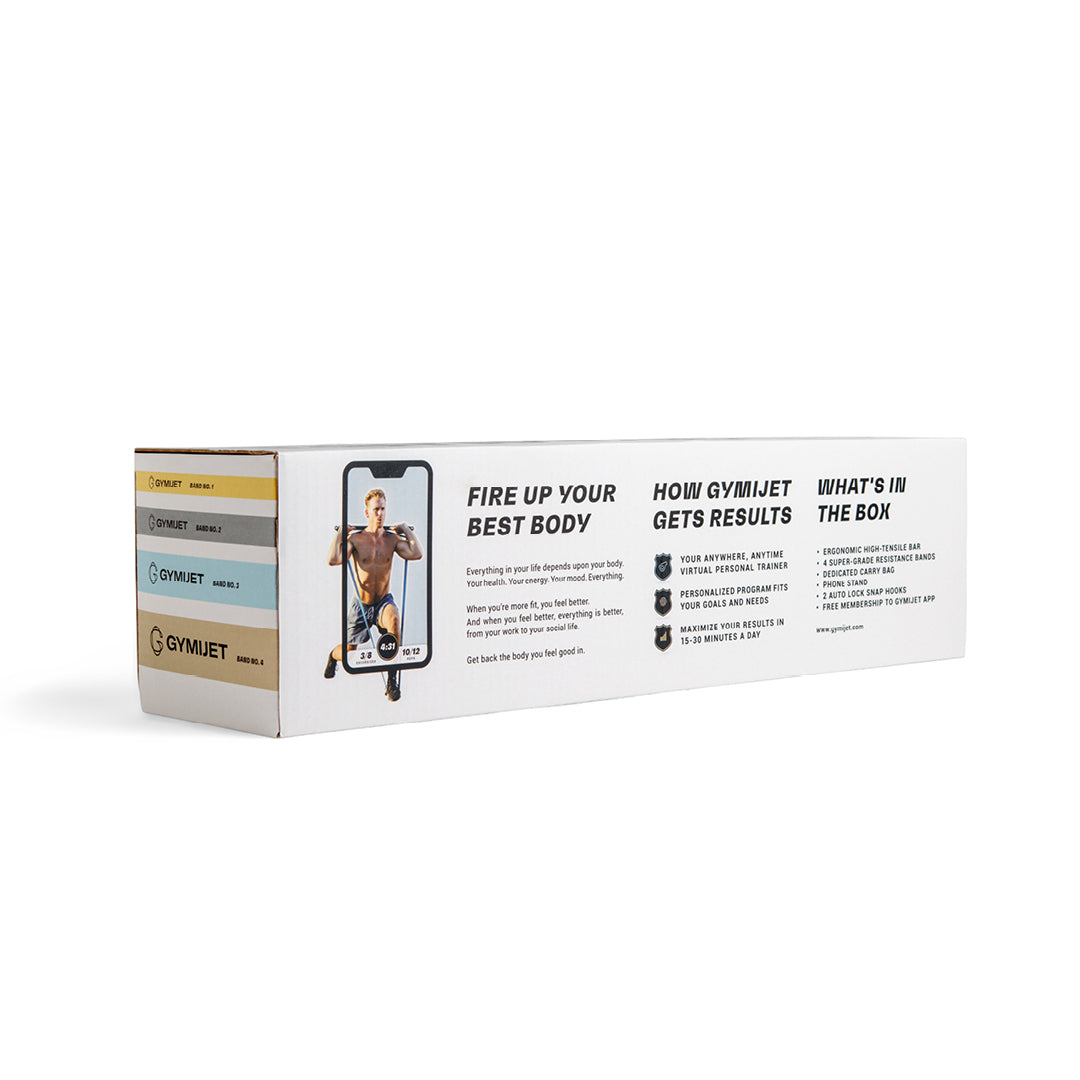
Mom Fitness Routine: Balancing Workouts With Family Life
Share
Being a mom often feels like juggling a dozen responsibilities while having barely enough hours in the day. Between school pickups, meal prep, work deadlines, and bedtime routines, finding time for your own fitness can seem impossible. Only 27% of postpartum women feel they have the opportunity to be physically active, despite knowing exercise could boost their energy and mental health.
The traditional approach to fitness doesn't work for most mothers. Rigid gym schedules, lengthy commute times, and childcare complications create barriers that feel insurmountable. But what if you could build a sustainable fitness routine that adapts to your life, rather than competing with it? Smart planning, realistic expectations, and the right tools can help you reclaim your health while thriving as a mom.
The Challenge: Why Traditional Fitness Fails for Busy Mothers
Time scarcity hits mothers harder than any other demographic. Research shows that mothers in nuclear families spend 51 hours monthly on health and wellness compared to 58 hours for single women, losing nearly two hours per week for self-care. When you factor in the 54 minutes daily spent on direct childcare and 35 minutes on play with children, personal time becomes a precious commodity.
The barriers multiply with family complexity. Only 27% of mothers with one child cite lack of childcare as an exercise barrier, but this jumps to 42% with two children and 46% with three or more. Add household management responsibilities (affecting 36% of mothers versus 9.2% of women with adequate self-care time), and the challenge becomes clear.
Beyond logistics, psychological barriers create internal resistance. Many mothers experience guilt about taking personal time, viewing exercise as "selfish" when the family needs attention. This identity conflict between being a "good mother" and prioritizing self-care creates mental obstacles that willpower alone cannot overcome.
The support gap compounds these challenges. While 50% of mothers want to be more active, only 8% of pregnant women and 10% of postpartum women feel supported in their fitness goals. Traditional fitness solutions, such as gym memberships, group classes, and personal trainers, weren't designed for the realities of modern motherhood.
Practical Solutions: Building a Flexible Fitness Framework
Start with micro-commitments rather than major overhauls: Instead of planning hour-long workouts you'll struggle to maintain, begin with 15-minute sessions that feel achievable. Research shows that 15-30 minute workouts provide legitimate fitness benefits when properly structured, especially when accumulated throughout the week to reach 150 minutes or more.
Embrace "exercise snacking" for unpredictable days: Recent studies demonstrate that brief, frequent exercise bouts can provide meaningful health benefits. Even 15-30 seconds of vigorous exercise, performed three times daily, improved cardiorespiratory fitness by 17-18%. This approach reduces psychological barriers by requiring a minimal time commitment, while accommodating unpredictable family demands.
Schedule fitness like any other important appointment: Time management experts recommend "designing your ideal week" by planning life hour-by-hour. Identify realistic windows, such as early morning before the kids wake up, during nap times, or while dinner cooks, and protect these moments as non-negotiable self-care time.
Integrate family time whenever possible: Rather than viewing exercise as a competing activity, find ways to include children in your routine. Dance parties in the living room, playground workouts while kids play, or nature walks double as quality time and physical activity. This approach eliminates guilt while modeling healthy behaviors.
Focus on compound movements for maximum efficiency: Exercises that work multiple muscle groups simultaneously. Squats, lunges, push-ups, and planks deliver more results in less time. A 20-minute session of compound movements can be more effective than an hour of isolated exercises.
How Gymijet Solves This Problem
Gymijet transforms how busy mothers approach fitness by bringing a complete gym experience into any space. At just 6 pounds, this portable AI gym eliminates the barriers that traditionally derail maternal fitness routines.
The AI technology adapts to your reality as a mom. Rather than following rigid programs, Gymijet's intelligent system adjusts workouts based on your available time, energy levels, and progress. Whether you have 15 minutes during naptime or 45 minutes before the family wakes up, the AI optimizes every session for maximum effectiveness.
Perfect rep recognition ensures workout efficiency: The AI only counts completed movements with proper form, which means every minute of your limited exercise time delivers results. Instead of wondering if you're doing exercises correctly, you receive real-time feedback that maximizes the impact of shorter sessions.
Progressive resistance adapts as you strengthen: As your fitness improves, Gymijet automatically increases challenge levels, ensuring continued progress without the need to purchase additional equipment or upgrade gym memberships. This scalability makes it ideal for postpartum recovery, which progresses from gentle movement to strength building.
Compact storage fits any living situation: Whether you're in a small apartment, traveling with family, or simply don't want equipment cluttering your space, Gymijet stores easily while providing the resistance range of a full weight room. No more excuses about lack of space or equipment access.
Expert Tips: Professional Insights for Mom Fitness Success
- Exercise Reduces Postpartum Depression Risk by 40% - Meta-analysis research published in PubMed demonstrates that exercise-based interventions significantly reduce postpartum depression symptoms, with effect sizes ranging from 0.41-0.67. Regular physical activity during the postpartum period offers mental health benefits comparable to those of many therapeutic interventions.
- Home Workouts Are Equally Effective as Gym Sessions - Studies from the National Center for Biotechnology Information confirm that home-based exercise programs produce identical cardiovascular and strength improvements compared to gym-based training when properly structured. This eliminates commute time, childcare needs, and scheduling barriers that derail maternal fitness.
- Schedule Exercise During Your Natural Energy Peaks - Research from BMC Public Health on working mothers reveals that timing workouts during personal energy peaks (often early morning or after children's bedtime) increases completion rates by 67% compared to forcing exercise during low-energy periods.
- High-Intensity Intervals Maximize Limited Time - Clinical studies on maternal HIIT training show that 15-20 minute high-intensity interval sessions provide superior cardiovascular benefits compared to 45-60 minutes of moderate exercise, making them ideal for mothers with severe time constraints.
- Your Activity Level Directly Influences Your Children's Health - University of Cambridge research has found that mothers have twice the influence on children's physical activity patterns as fathers. Active mothers raise children who are 3x more likely to meet physical activity guidelines throughout their lives.
FAQs
Can I work out for at least 15 minutes after giving birth?
Most women can begin gentle exercises, such as walking and pelvic floor exercises, within days of an uncomplicated vaginal delivery. However, always consult your healthcare provider first. For cesarean sections, wait for medical clearance, typically around 6-8 weeks, before beginning structured exercise programs.
What exercises can I do in a small living space without disturbing neighbors?
Low-impact bodyweight exercises are ideal for small spaces and those with noise concerns. Try squats, lunges, modified push-ups, planks, glute bridges, and resistance band exercises for a comprehensive workout. These compound movements provide full-body benefits while maintaining apartment-friendly noise levels.
How do I stay motivated when I'm exhausted from parenting?
Focus on how exercise makes you feel immediately afterward rather than long-term goals. Research shows that framing workouts as "energy boosts" and "stress relief" rather than "weight loss" dramatically improves consistency for busy parents. Begin with 10-15 minutes to prove the energy benefit firsthand.
Is it safe to exercise while breastfeeding?
Yes, exercise is safe and beneficial while breastfeeding. Stay well-hydrated, wear a supportive sports bra, and feed or pump before exercising to reduce discomfort. Exercise doesn't affect milk quality or quantity when you maintain adequate nutrition and hydration.
How long should I work out for the best results?
For optimal results, aim for at least 30 minutes of exercise daily for 60+ days. However, starting with 15-minute sessions builds consistency and confidence. Remember that any movement is better than none. Even 10-minute "exercise snacks" throughout the day provide meaningful health benefits for busy mothers.
Create Your Fitness Routine With Gymijet
Creating a sustainable fitness routine as a mother is about making smarter use of the time you have. By embracing flexible approaches, such as exercise snacking, focusing on immediate benefits rather than long-term goals, and utilizing technology that adapts to your reality, you can reclaim your health without sacrificing family priorities.
The research is clear: regular exercise provides crucial mental health benefits, increased energy, and better stress management. With the right tools and mindset, fitness becomes a source of strength that enhances rather than competes with your role as a mom.
Ready to build a fitness routine that works with your family life, not against it? Start your AI-powered fitness journey with Gymijet Today and discover how 15 minutes can transform your energy, mood, and strength.














